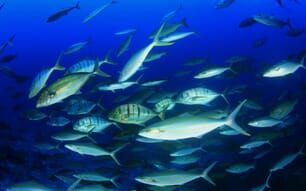Thailand is the third largest seafood exporter in the world with its international reach making human trafficking and exploitation in the sector a serious global issue. EJF’s new Slavery at Sea report argues that insufficient progress is being made by Thailand to suppress and prevent human trafficking in its fishing industry. It makes the case for the US State Department to consider downgrading Thailand to Tier 3 – the lowest ranking possible – in its forthcoming 2014 Trafficking in Persons (TIP) report.
EJF’s 2014 investigations have found that endemic corruption, poor enforcement, inadequate victim support, unacceptable working conditions and deficient migration policy have not been addressed.
A 21 year old Burmese migrant interviewed by EJF in 2014 reports that he was promised a “good job with overtime pay at a pineapple factory in Thailand” before being trafficked into the country. On 11 March 2013 he and 36 other Burmese migrants began a journey that for many would lead to being sold onto Thai fishing vessels. Three travelers were lost along the way including an elderly man who it is believed was murdered for refusing to go on.
This trafficking victim reports being transported with five others in a marked police car, driven by men in plain clothes, before being forced onto a fishing vessel in Samae San, in the Chonburi province of Thailand, in March 2013. He was compelled to work on the boat for ten months without pay before he managed to escape. He and his fellow crew suffered abuse and violence at the hands of the boat’s captain, including one attack that left him partially deaf.
The Myanmar Association of Thailand (MAT), one of EJF’s local partners, reported that in the period between January 2013 and February 2014, they were involved in 29 individual rescue operations, rescuing a total of 201 trafficked migrants from Thai fishing vessels.
A Thai interpreter who has worked on cases involving human trafficking onto fishing boats for over a decade, revealed to EJF that business owners, the police, shelter staff, court officials and even judges routinely pressure victims of human trafficking to drop their cases and return home.
Slavery at Sea revisits a case of 14 men rescued from a port in Kantang in March 2013 following months of exploitation, abuse and violence aboard a Thai fishing vessel including threats of murder (first documented in EJF’s 2013 Sold to the Sea report).
By returning to this still live case, EJF presents firsthand accounts of the experiences of trafficking victims from within the Thai system and an ongoing example of the Government’s failure to support victims or facilitate an effective judicial process against perpetrators of trafficking. A year on, the victims interviewed by EJF told of their frustration at the slow legal process, confusion over the exclusion of the wealthy boat owner from the case, their lack of legal support or interpretation services and their now overwhelming desire to return home, even if it means the perpetrators escape justice.
The Burmese broker connected to the Kantang case, who is reported to have been responsible for the murder of 40 migrant workers, was arrested following the publication of EJF’s Sold to the Sea report.
However there has been no action against the boat owner or the local officials who are alleged to have been involved. A senior officer in the Royal Thai Police involved in the Kantang case in 2013 revealed to EJF this year that he received phone calls from numerous influential individuals urging him not to investigate the local businessman whose pier and fishing boats were implicated in the case.
EJF also spoke to a senior officer in the Thai Immigration Bureau who said that inspectors tasked with identifying trafficking victims regularly used pier gang masters to communicate with migrant workers, despite them often being key components of the networks of brokers, business owners and corrupt local officials involved in trafficking onto fishing vessels.
Compelling new evidence was discovered exposing a link between over-fishing, resulting from poor fisheries management, and human trafficking and labour abuses onboard boats. Reduced catches are forcing operators to fish further away and for longer periods of time. This emerging trend means inspections are even less likely and one boat owner told EJF that workers were being transferred between boats at sea in order to avoid inspections in port and prevent them from escaping.
The EU imported more than $1.15 billion (€835.5 million) worth of seafood from Thailand in 2012. EJF’s Slavery at Sea report urges EU politicians to consider human trafficking in ongoing trade negotiations between the EU and Thailand.
The value of seafood imported by the United States from Thailand exceeded $1.6 billion in 2013. EJF is calling on the US State Department to consider downgrading Thailand to Tier 3 in its forthcoming 2014 Trafficking in Persons (TIP) report. Importantly, in 2013 a law came into effect limiting the number of years a country could be on the Tier 2 Watchlist. This law requires that Thailand is either upgraded to Tier 2 or downgraded to Tier 3 in the 2014 report due to be released in June.
Steve Trent, Executive Director of EJF, said: “Migrant workers in the Thai fishing industry, many of them trafficked illegally, are suffering terrible abuses and all too often are denied their basic human rights. These people are Thailand’s ‘seafood slaves’ forced to work to prop up the cash-rich fisheries industry of the world’s third largest exporter of seafood. Our Governments and the international seafood industry simply cannot continue to ignore this, they must demand immediate reform and action to stop these abuses or refuse Thai seafood that is produced by slaves.”
“It is also increasingly clear that the Thai Government’s chronically poor fisheries management has exacerbated this problem, as stocks have been over-fished and declining catches have led to operators cutting costs further by using slave and forced labour, keeping them at sea longer to make the catch. To create a sustainable and ethical fisheries industry the Thai Government must also address this fundamental problem.”
Further Reading
You can view the full report by clicking here.



